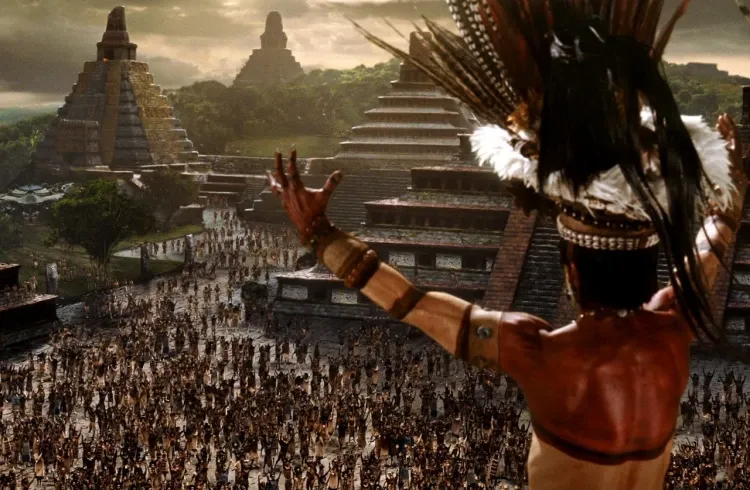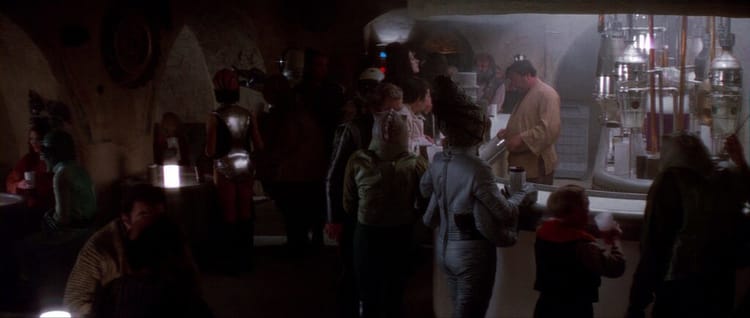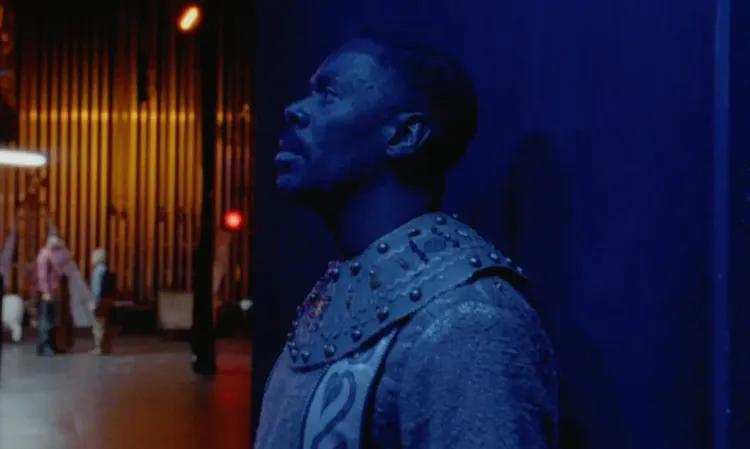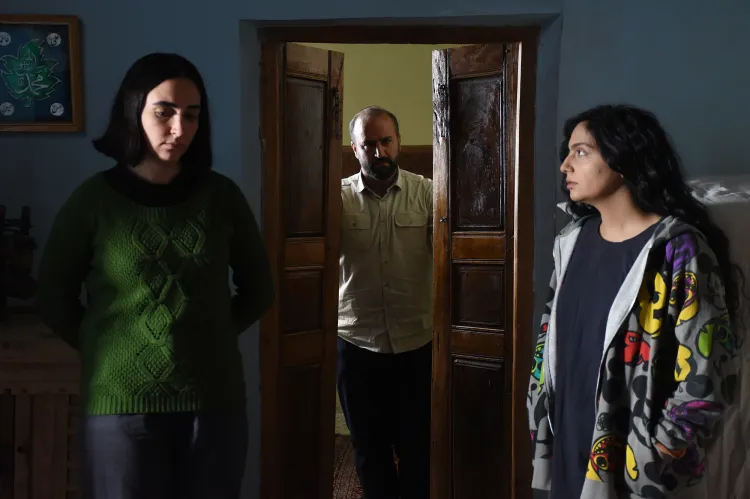Apocalypto: Tell-Tale Eclipse of the Heart

Greetings! A good stretch of North America got to witness a solar eclipse on Monday. It was pretty cloudy out my way, which wasn't even in totality, but I did get to experience the full effect of the 2017 eclipse. It was akin to a religious experience, being able to experience the vastness of the cosmos for a couple minutes. This week's eclipse seemed a good occasion to finally watch a movie involving an eclipse that is also like a religious experience, albeit for very different reasons.
These days Mel Gibson being a tradcath sicko is less surprising than his return to respectable company. In the mid-2000s, however, it was a topic still novel enough to make a South Park episode about. It's hard to recall now, but for well over a decade Gibson had been Hollywood royalty: People magazine's first Sexiest Man Alive in 1985, director and star of the 1995 blockbuster and Acadamy Award Best Picture winner Braveheart, the face of a 2000 movie literally titled What Women Want. At the turn of the millennium Gibson was American mainstream masculinity personified.
The Passion of the Christ changed all that. Its protracted torture scenes divided the audience between rapt believers and disgusted skeptics, and the specter of antisemitism haunted the film's roll-out due to the movie itself as well as Gibson's sectarian Catholic father's rants about 9/11 and the Holocaust in national press outlets. When Gibson was quoted in the police report of a July 2006 drunk driving arrest, ranting that the Jews cause all the wars, his transformation from sex symbol to raving lunatic, from mainstream Hollywood to Mahmoud Ahmadinejad, was complete. The incident more or less killed his career as it was.
At that point, however, Gibson had just wrapped shooting on his follow-up film, which released December 8 of that year. That timing is important. Conceived and filmed after The Passion of the Christ became the most successful independent film ever made but before Gibson's arrest and any consciousness about his image that could result, Apocalypto represents Gibson vindicated, doubling down on the stubborn vision that had led him to self-produce Passion in the first place and broadening the scope of his mortification from The Man to the Mayan civilization. It is a sick movie in every sense, one of the most evil I've seen in a while; and yet I couldn't take my eyes off it. For it is also relentlessly thrilling and occasionally breathtaking. It might well be Mel Gibson's best film, in that it is the purest expression of his earnest, terrifying belief in the spiritually purifying power of violence.
The movie wastes no time making its point. After a Will Durant epigram about how fallen civilizations are first destroyed from within, we are presented with a contrasting vision: life as hunt, with a wild tapir, chased through the jungle, brought down by a group of forest tribesmen. A further contrast: a capable warrior, Jaguar Paw (Rudy Youngblood), and his fellow tribesmen Blunted (Jonathan Brewer), who in the movie's weird sex comedy first act is subject to hazing by his peers, hen-pecked by his shrewish mother-in-law, and unable to get his wife with child. Jaguar Paw meanwhile has a toddler, Turtle Run (Carlos Emilio Báez), and a wife (Dalia Hernández) who is ripe with their second child. Gibson's hero is an avatar of virility, which Blunted's impotence, down to his name, serves to highlight.
It is no wonder that Jaguar Paw's father Flint Sky (Morris Birdyellowhead) favors him so, nor that fate should do the same. Though Flint Sky counsels him to strike fear from his heart after an unsettling encounter with the passing survivors of a recently destroyed village, he is granted a prophetic dream that awakens him just as their village is raided by a band led by the imperious Zero Wolf (Raoul Trujillo). Jaguar Paw manages to hide his family in a pit before he is captured with the rest of the village. Women are raped, a baby is threatened in an especially upsetting moment, and Flint Sky is executed—nobly and stoically of course. The villagers are marched to a city, to be sacrificed atop a pyramid to appease the sun.
The unnamed Mayan city is a new world Babylon—both the city of biblical iniquity, and one-extravagant-fourth of D.W. Griffith's Intolerance. A sprawl of huts and pyramids was constructed in Veracruz and then populated by some 700 extras arrayed in culturally if not historically specific costume, jewelry, and makeup, and then staged as a Boschian nightmare. Chalk-white dusted slaves laboring in quarries, grotesque invalids, and a decrepit old man stricken with laughing sickness juxtaposed with luxurious bejeweled women and, worst of them all, a fat child who looks on the procession of the damned with haughty condescension. (I'm not exaggerating, Gibson's camera is absolutely judging this poor kid.) You can feel the debasement.
The opening quote has already primed this idea that Mayan civilization was corrupt beyond saving. On the way to the city, a sore-stricken girl will prophesy the slavers' doom, and the ending, with the arrival of the Spaniards and Catholicism, will bring it to pass. That's the intended and straightforward reading, and a pernicious one at that, rationalizing the slaughter of 'inferior' peoples with a story of hardy rural yeomen laid low by a decadent urban elite. One reactionary canard explains another. It's a more sophisticated version of Manifest Destiny: instead of arguing for the inherent inferiority of indigenous populations, the movie paints them as degenerate, fallen from some previous glory and needing to be cleansed.
Yet in this dissembling the movie muddies its own perspective. For while there is certainly an element of gawking, there is also admiration. The assembly of an entirely indigenous cast, speaking Yucatec Maya, is certainly not the work of a knee-jerk bigot. Gibson's stated purpose for the movie was a warning about Iraq War-era America, and in the warrior class, which includes Zero Wolf and his raiding party too, he sees an ideal. Even with his own howlingly ahistorical construction of Mayan society—which includes not knowing when eclipses happen despite having developed an accurate calendar—Gibson can't make everyone soft and effete. Moreover he cannot convincingly portray the Mayans' ritualistic human sacrifice as the ultimate depravity, for ritualistic human sacrifice is the bloody, beating heart of Mel Gibson's worldview.
From the disfigured Man Without a Face being figuratively crucified by his community to Jesus' flayed meat rig being literally so, every one of Gibson's movies valorizes and apotheosizes the spectacle of physical torment. Years before The Passion of the Christ, every spring my high school youth group's leaders would screen the ending of Braveheart, of Gibson-as-William-Wallace being hanged, drawn, and quartered as punishment for his rebellion against the English Crown—as an illustration of Christ's suffering. Even Hacksaw Ridge, which isn't about bodily torture specifically, is about pacifist Desmond Doss' stoic refusal of violence in the face of the relentless carnage of the Pacific Theater of World War II. Struggle, suffering, and martyrdom are so central to these movies' stories—at the expense of equally relevant themes like cooperation or justice—that Gibson's movies would be nothing without them.
Thus we get Apocalypto's human sacrifice sequence, which is awesome in the original sense of the word. At first the camera is fixed to the marchers, looking up to the great pyramid. Then it teases what is to come as the procession climbs the scaffolding , the occasional severed head rolling in, down, and out of frame. Then at the top a high priest (Fernando Hernández), with booming oratory and an outstretched arm, takes center stage. He revs up a screaming crowd of thousands with talk of destiny and satisfying the gods like a cross between a wrestling promoter and a pulpit preacher. When he plunges his knife into the first victim's chest and pulls out his heart we view it from the front, from a wide shot. Then close-up, as we see the reactions of Zero Wolf and the captives. Then a waist-up medium shot of the priest holding the heart aloft, and as he turns the camera follows the hand and heart to reveal the screaming masses below as he roars, "The heart of god!" There are reaction shots among the editing scheme to try to keep us tethered to Jaguar Paw's point of view, but the overwhelming feeling communicated by the lavish staging isn't the visceral terror of the prisoners, but the religious ecstasy of the crowd. It is so very Triumph of the Will.
Indeed, throughout the movie I could not stop thinking of Susan Sontag's 1975 essay "Fascinating Fascism," a surgical deconstruction of Leni Riefenstahl's post-war rehabilitation with the then-recent publication of Riefenstahl's photography book The Last of the Nuba. The photos document and idealize a beautiful and robust southern Sudanese mountain tribe in the last years before their exposure to the temptations of capital and technology. Riefenstahl was, like Gibson, enthralled with the physical prowess of these unspoiled peoples, with the waning days of their vigorous way of life giving it an air of tragic romance. As described by Sontag, the book depicts how
...[T]he almost naked primitives, awaiting the final ordeal of their proud heroic community, their imminent extinction, frolic and pose under the scorching sun.
It is Götterdämmerung time.
The appeal of the African Nuba to the Aryan propagandist was their aestheticism and athleticism, the centrality of wrestling matches and funerals, "vivid encounters of beautiful male bodies and death" in which the strong triumph over the weak. They embodied values the Nazis valorized: "the contrast between the clean and the impure, the incorruptible and the defiled, the physical and the mental, the joyful and the critical," and, in Riefenstahl's words, "look upon death as simply a matter of fate—which they do not resist or struggle against."
Jaguar Paw does resist, but not helplessly; he waits for fate, the opportunity to escape, to present itself. Once back in his jungle he picks off and eviscerates his pursuers with fiendishly clever traps. Even his wife Seven is given heroic duty that is, of course, maternal and utterly deranged: while a flash flood fills up the pit she and her son are trapped in, she goes into labor and gives birth underwater. However Gibson may feel about the superiority of European Christendom over Mesoamerican heathen tribes, he has contrived in his rugged jungle people a specimen of man stripped of civilization's corrosive influences and reduced to pure action.
Which isn't to say that Mel Gibson is a secret Nazi. Rather, that his preoccupations as a director, the ugly details of his personal conduct that continued to surface for years after his arrest, and his "traditionalist" Catholicism fit comfortably with fascist aesthetics of power and domination and death. I don't actually have a good answer for what to "do" with Gibson now that he is returned, albeit diminished, to Hollywood. He has been sober for over a decade and by all accounts is a professional to work with. His movies make money. He does his job well.
The hell of it is, Gibson is an outstandingly effective director, and arguably more influential than may be supposed. I can't think of anything in previous pop culture like Apocalypto's breed of viscères vérité (though its 2006 contemporary 300 has a similar and even more pronounced fascist death drive), but having seen it I can't imagine HBO's Game of Thrones and its torture porn take on Ramsay Bolton without it. But even that's selling Gibson short. His spiritual sadomasochism is utterly sincere, without a trace of cool edginess, and that carries over into his filmmaking. It is more compelling and convincing than his grimdark Jesus movie, which had to at least gesture towards Christian notions of charity and mercy. Apocalypto has no mercy. It presents a world that is universally hostile, hopelessly corrupt, and savagely violent, in which the only response is to be even more ruthless than your enemy. Whosoever shall smite thee on thy right cheek, turn their left into panther food.





Member discussion